Affordable SEO Strategies for Small Businesses:
A Comprehensive Guide to Success
Table Contents
Introduction and Importance of SEO for Small Businesses
Key Components of Affordable SEO
Measuring the Success of Affordable SEO Strategies
Creating SEO-Optimized Content for Small Businesses
Building Backlinks for Small Businesses
Measuring SEO Success for Small Businesses
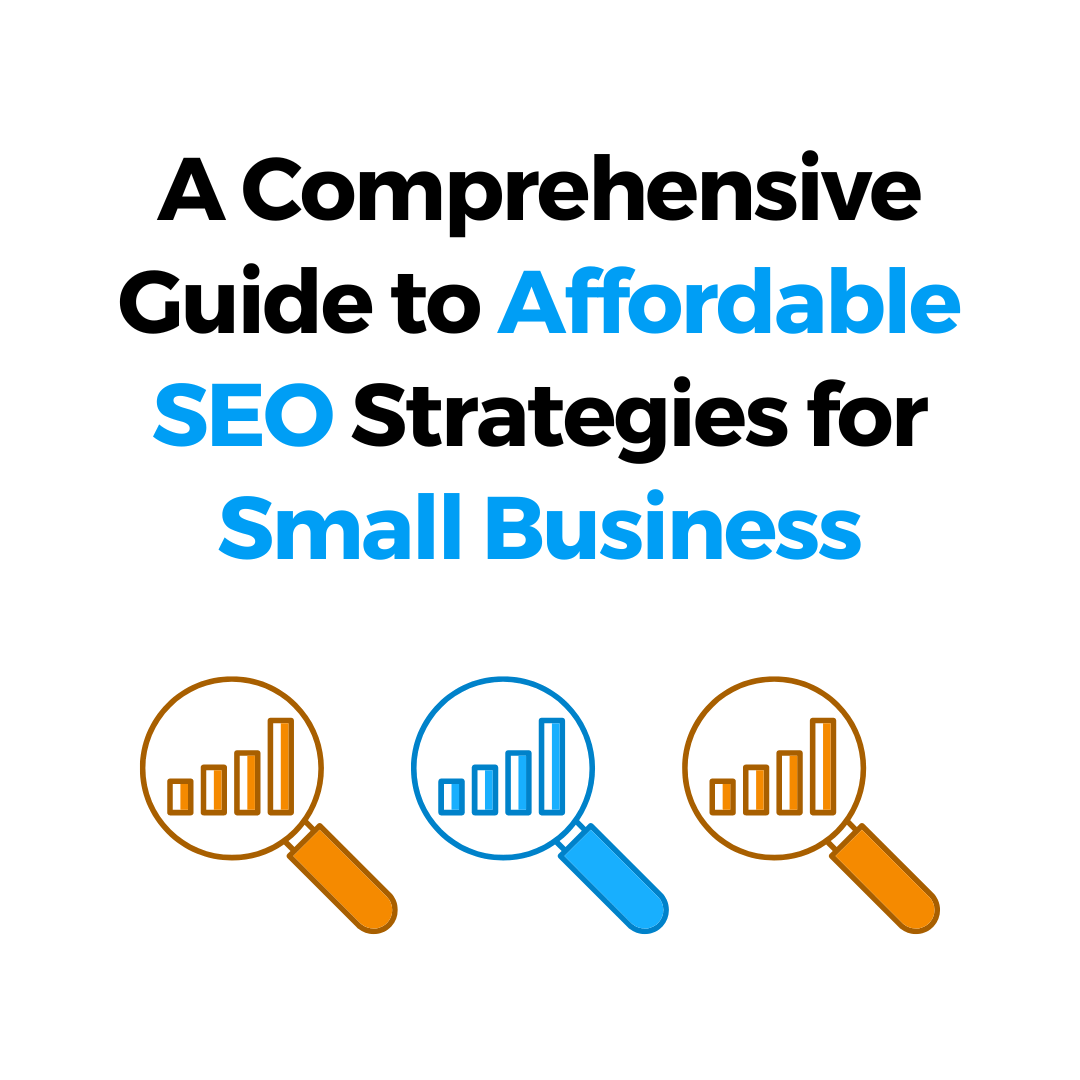
Introduction and Importance of SEO for Small Businesses
Search Engine Optimization (SEO) is the process of improving a website’s visibility and ranking on search engine results pages (SERPs) through various on-page and off-page optimization techniques. SEO is a critical component of digital marketing and is especially important for small businesses. In this blog, we will explore the importance of SEO for small businesses, the challenges they face in implementing SEO, and the need for affordable SEO solutions.
Small businesses often struggle to compete with larger businesses, especially in the digital space. They have limited budgets and resources, making it difficult for them to create a strong online presence. This is where SEO comes in – it provides small businesses with an affordable and effective way to reach their target audience and increase their visibility online.
SEO can help small businesses in several ways. First, it can drive more traffic to their website, which can lead to increased sales and revenue. By optimizing their website for search engines, small businesses can appear at the top of search results when potential customers search for relevant keywords. This increases the chances of their website being visited and helps them reach their target audience.
Second, SEO can help small businesses build their brand and reputation. By appearing at the top of search results, small businesses can establish themselves as leaders in their industry and gain the trust and confidence of potential customers.
Despite the benefits of SEO, small businesses face several challenges in implementing it. One of the biggest challenges is the lack of knowledge and expertise in SEO. Many small business owners do not have the technical skills or knowledge required to implement SEO strategies effectively. They may also not have the time to learn and implement SEO themselves, as they are focused on running their business.
Another challenge is the cost of SEO services. Many small businesses cannot afford to hire a dedicated SEO team or agency, which can be expensive. This is where the need for affordable SEO solutions comes in. Small businesses need cost-effective SEO strategies that can deliver results without breaking the bank.
SEO is essential for small businesses as it provides an affordable and effective way to reach their target audience and increase their visibility online. However, small businesses face several challenges in implementing SEO, including the lack of knowledge and expertise and the high cost of SEO services. In the following parts of this essay, we will explore affordable SEO strategies that small businesses can use to improve their online presence and achieve their business goals.
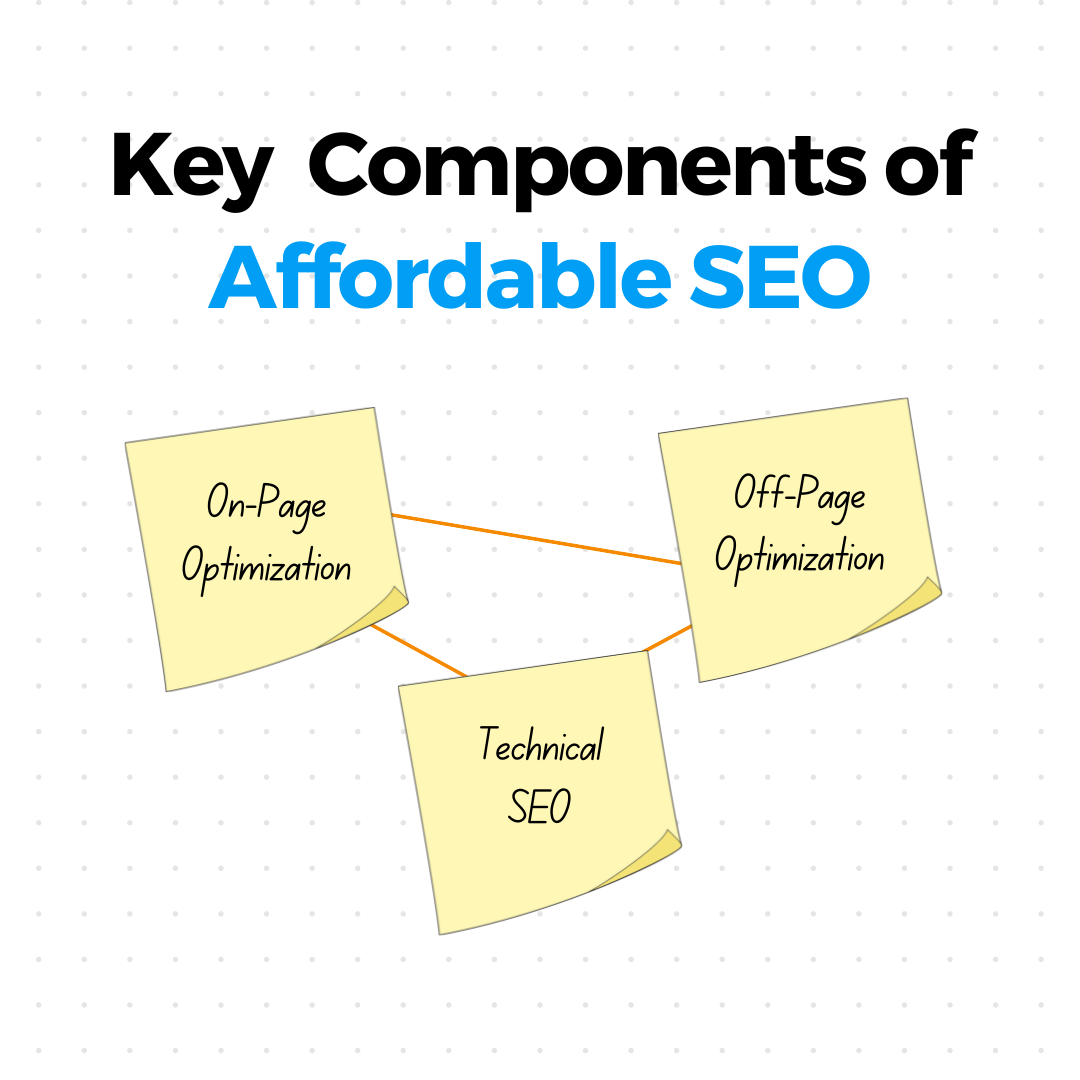
Key Components of Affordable SEO
Search engine optimization (SEO) is the process of optimizing a website to rank higher in search engine results pages (SERPs) for specific keywords and phrases. Effective SEO can increase visibility and drive more organic traffic to a website. SEO is comprised of three key components: on-page optimization, off-page optimization, and technical SEO. In this section, we will outline the key components of SEO and highlight affordable SEO strategies for each.
On-page Optimization
On-page optimization refers to the various elements on a website that can be optimized to improve rankings in search engine results pages. This includes optimizing page titles, meta descriptions, header tags, content, and images. On-page optimization can be a cost-effective SEO strategy as it only requires changes to be made on the website itself. Here are some affordable on-page optimization strategies:
On-page Optimization Strategies
- Conduct keyword research to identify the best keywords to target on each page of the website.
- Optimize page titles and meta descriptions with the targeted keywords to improve relevance and click-through rates.
- Use header tags to structure content and make it easier for search engines to understand the page’s content.
- Create high-quality content that is valuable and engaging to readers and includes targeted keywords.
- Optimize images by compressing file sizes and adding alt tags with targeted keywords.
Off-page Optimization
Off-page optimization refers to the various external factors that can influence a website’s ranking in search engine results pages. This includes backlinks, social media signals, and other external factors. Off-page optimization can be a more challenging and time-consuming component of SEO, but there are still affordable strategies that can be effective, such as:
Off-page Optimization Strategies
- Create high-quality content that is valuable and shareable to encourage others to link back to the website.
- Leverage social media channels to share content and engage with followers to build a following and increase brand awareness.
- Reach out to relevant websites and bloggers to request a link back to the website.
- Participate in online forums and communities related to the business industry to build relationships and increase brand visibility.
Technical SEO
Technical SEO refers to the various technical elements of a website that can impact search engine rankings. This includes site speed, mobile-friendliness, site structure, and more. Technical SEO can be a more complex component of SEO, but there are still affordable strategies that can be effective, such as:
Technical SEO Strategies
- Optimize site speed by compressing images and utilizing browser caching.
- Ensure the website is mobile-friendly and responsive to provide a better user experience for mobile users.
- Use structured data markup to help search engines better understand the website’s content and structure.
- Fix broken links and 404 errors to improve the website’s overall usability and user experience.
SEO is a critical component of any small business’s digital marketing strategy. By optimizing their website and implementing affordable SEO strategies, small businesses can improve their visibility in search engine results pages, drive more organic traffic to their website, and ultimately increase leads and sales. By implementing on-page optimization, off-page optimization, and technical SEO, small businesses can improve their website rankings and attract more potential customers.
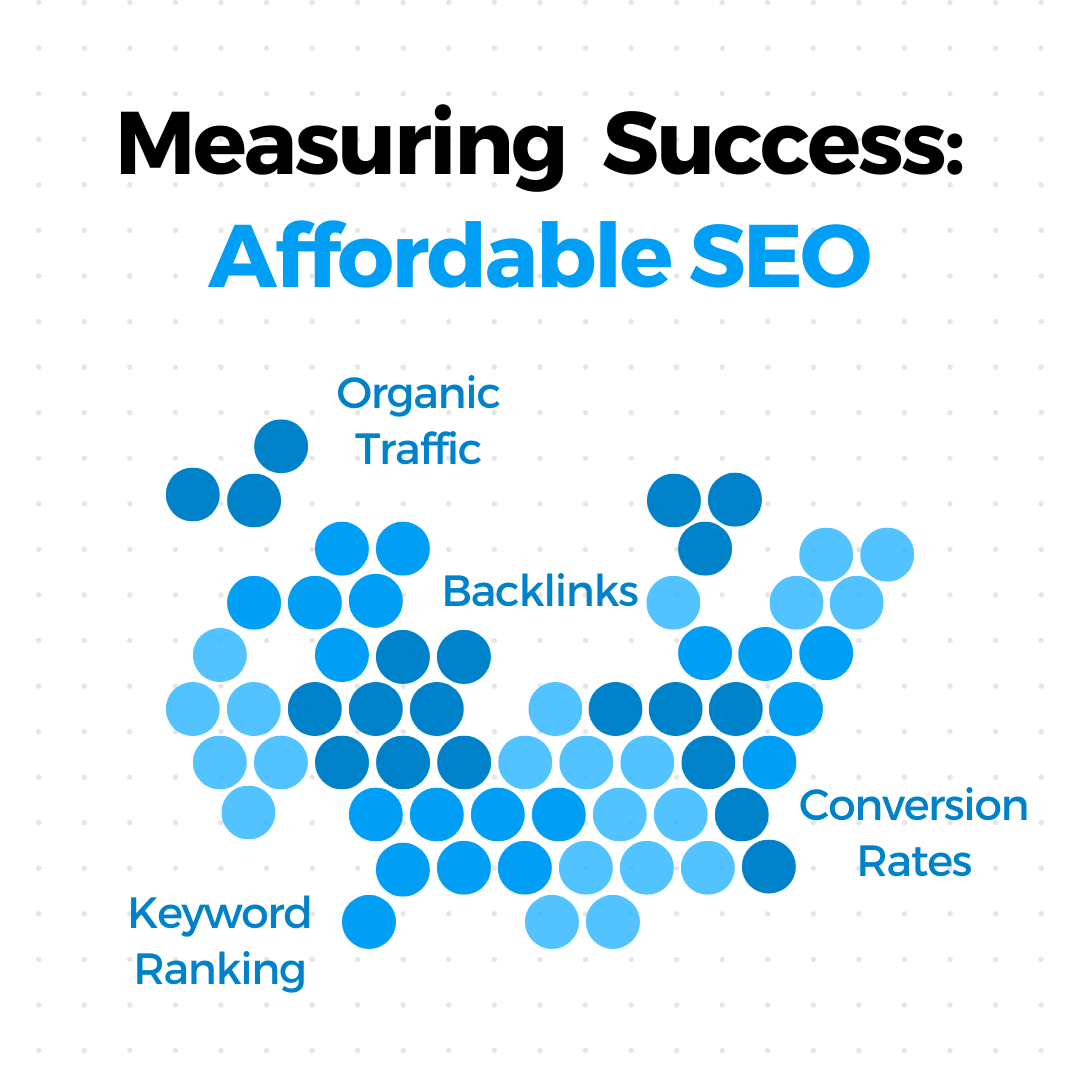
Measuring the Success of Affordable SEO Strategies
After implementing affordable SEO strategies, it is essential to track and measure the success of those strategies. Measuring the success of SEO can help small businesses identify areas for improvement and adjust their strategy accordingly. In this section, we will outline some key metrics that small businesses should track to measure the success of their affordable SEO strategies.
Organic Traffic
Organic traffic refers to the number of visitors to a website that came from search engines such as Google, Bing, or Yahoo. Tracking organic traffic can help small businesses understand how their SEO strategies are impacting their website’s visibility in search engine results pages. By tracking organic traffic over time, small businesses can identify trends and adjust their SEO strategy accordingly.
Keyword Rankings
Tracking keyword rankings can help small businesses understand how their website is ranking for specific keywords and phrases in search engine results pages. By tracking keyword rankings, small businesses can identify which keywords are driving the most traffic to their website and adjust their strategy accordingly. Additionally, tracking keyword rankings can help small businesses identify opportunities to optimize their website for new keywords.
Backlinks
Backlinks are links from other websites that link back to a small business’s website. Tracking backlinks can help small businesses understand how their off-page optimization strategies are impacting their website’s visibility in search engine results pages. By tracking backlinks, small businesses can identify which backlinks are driving the most traffic to their website and adjust their off-page optimization strategy accordingly.
Conversion Rates
Conversion rates refer to the percentage of website visitors that take a desired action on a website, such as making a purchase, filling out a contact form, or signing up for a newsletter. Tracking conversion rates can help small businesses understand how their website’s design and content are impacting their ability to convert website visitors into customers. By tracking conversion rates over time, small businesses can identify areas for improvement and adjust their website’s design and content accordingly.
Measuring the success of affordable SEO strategies is essential for small businesses to understand how their digital marketing efforts are impacting their bottom line. By tracking organic traffic, keyword rankings, backlinks, and conversion rates, small businesses can identify areas for improvement and adjust their SEO strategy accordingly. By continuing to implement affordable SEO strategies and tracking their success, small businesses can improve their website’s visibility in search engine results pages, drive more organic traffic to their website, and ultimately increase leads and sales.
Creating SEO-Optimized Content for Small Businesses
In today’s digital age, creating high-quality, SEO-optimized content is essential for small businesses looking to compete in online search results. SEO-optimized content refers to web pages, blog posts, and other types of content that are written with both users and search engines in mind. In this section, we will discuss the importance of creating SEO-optimized content, outline the key elements of such content, and highlight affordable content creation strategies for small businesses.
Importance of SEO-Optimized Content
SEO-optimized content plays a critical role in improving a small business’s search engine visibility and attracting organic traffic to its website. By using targeted keywords and providing high-quality, valuable content, small businesses can improve their website rankings and attract potential customers who are actively searching for products or services like theirs. Additionally, SEO-optimized content can help small businesses establish themselves as industry experts, build credibility, and increase brand awareness.
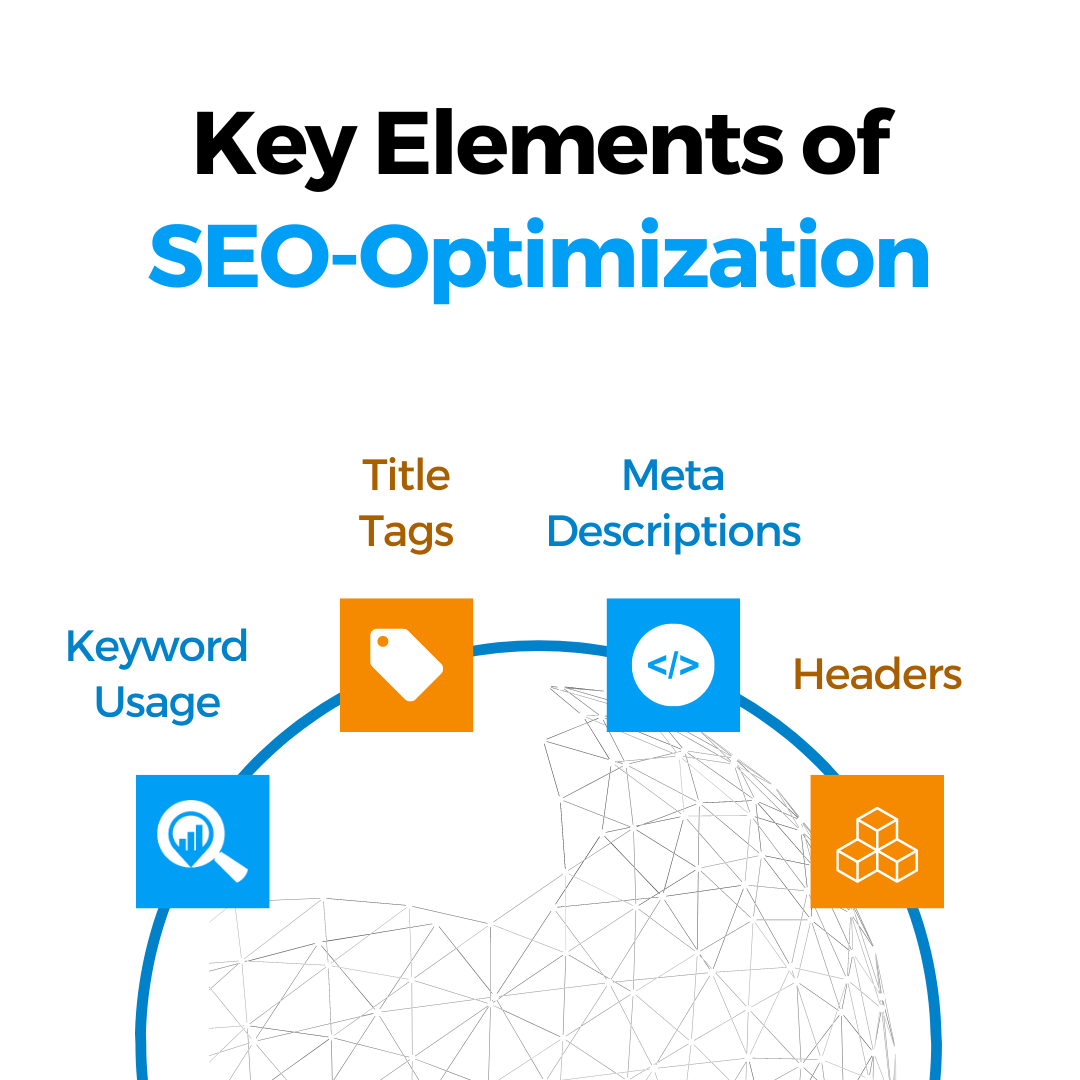
Key Elements of SEO-Optimized Content
To create effective SEO-optimized content, small businesses should focus on the following key elements:
Keyword Usage: Identify relevant keywords that your target audience is using to search for your products or services and incorporate them naturally into your content.
Title Tags: Title tags are HTML tags that provide a brief description of a web page’s content to search engines. Make sure your title tags are concise, descriptive, and include your target keywords.
Meta Descriptions: Meta descriptions are brief summaries of a web page’s content that appear below the page title in search engine results pages. Use them to provide a clear and concise description of your page’s content, and include your target keywords.
Headers: Use headers (H1, H2, H3) to structure your content and make it easier for users and search engines to navigate. Include your target keywords in your headers where appropriate.
Affordable Content Creation Strategies
Creating high-quality, SEO-optimized content can be expensive and time-consuming, but there are affordable strategies that small businesses can use to create effective content:
Repurpose Existing Content: Repurpose old blog posts, web pages, or social media content into new formats, such as videos or infographics.
Outsourcing: Outsource content creation to freelance writers or agencies that specialize in creating SEO-optimized content.
User-Generated Content: Encourage your audience to create and share user-generated content, such as reviews or testimonials.
DIY Tools: Use affordable DIY tools, such as Canva or Grammarly, to create professional-looking graphics or proofread your content.
Creating high-quality, SEO-optimized content is essential for small businesses looking to improve their search engine visibility, attract organic traffic, and establish themselves as industry experts. By focusing on key elements such as keyword usage, title tags, meta descriptions, and headers, small businesses can create effective content that resonates with their target audience and improves their search engine rankings. By using affordable content creation strategies such as repurposing existing content, outsourcing, user-generated content, and DIY tools, small businesses can create effective content without breaking the bank.
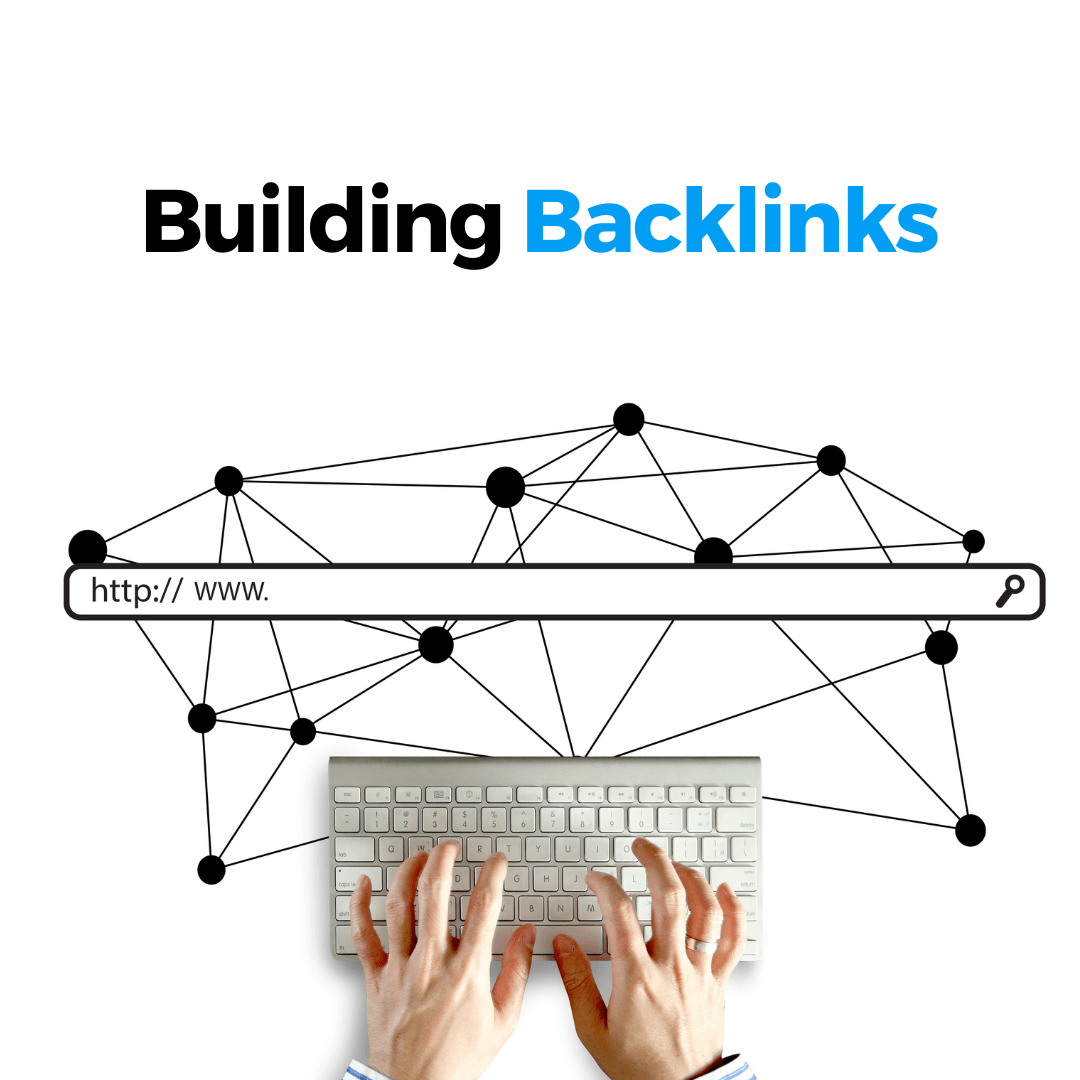
Building Backlinks for Small Businesses
Backlinks, also known as inbound links, are links from external websites that point to a small business’s website. Backlinks are a critical component of SEO, as they signal to search engines that other websites consider the small business’s website to be a valuable and trustworthy source of information. In this section, we will explain the importance of building high-quality backlinks and outline affordable link building strategies for small businesses.
Importance of Building Backlinks for SEO
Search engines use backlinks as a way to measure the authority and relevance of a website. The more high-quality backlinks a website has, the more likely it is to rank higher in search engine results pages. Additionally, backlinks can drive traffic to a small business’s website from external sources. However, it’s important to note that not all backlinks are created equal – search engines prioritize high-quality backlinks from reputable sources.
Strategies for Building Backlinks
There are several strategies small businesses can use to build high-quality backlinks to their website. Here are a few key strategies:
Guest Blogging
Guest blogging involves creating and publishing blog posts on other websites in exchange for a backlink to the small business’s website. This can be an effective way to build backlinks while also increasing brand awareness and reaching new audiences. Small businesses can identify relevant websites in their industry and pitch guest blog ideas to the website’s owner or editor.
Broken Link Building
Broken link building involves identifying broken links on other websites and reaching out to the website owner or editor to suggest a replacement link to the small business’s website. This can be a time-consuming strategy, but it can be effective for building high-quality backlinks from reputable sources. Small businesses can use tools like Ahrefs or SEMrush to identify broken links on relevant websites.
Social Media Promotion
Social media promotion involves promoting the small business’s website or content on social media channels to encourage others to link back to the website. This can be an effective way to build backlinks and increase brand awareness. Small businesses can also participate in online communities and forums related to their industry to build relationships and encourage others to share their content.
Affordable Link Building Strategies for Small Businesses
Link building can be a time-consuming and costly process, but there are several affordable strategies that small businesses can use to build backlinks. Here are a few affordable link building strategies:
Link Building Strategies
- Create high-quality, shareable content that others will want to link back to.
- Reach out to existing customers and partners to request a link back to the small business’s website.
- Use local directories and business listings to build backlinks from local sources.
- Participate in relevant industry associations and groups to build relationships and encourage others to link back to the small business’s website.
Bgotchauilding high-quality backlinks is a critical component of SEO for small businesses. By using guest blogging, broken link building, and social media promotion, small businesses can build backlinks from reputable sources and improve their website’s authority and visibility in search engine results pages. Additionally, by implementing affordable link building strategies, small businesses can achieve their SEO goals without breaking the bank.
Measuring SEO Success for Small Businesses
Search engine optimization (SEO) is an ongoing process that requires consistent effort and monitoring to ensure success. Measuring the effectiveness of SEO efforts is crucial for small businesses to identify what is working and what needs improvement. In this section, we will discuss the importance of measuring SEO success for small businesses, the key metrics to track, and affordable tools and techniques for measuring SEO success.
Importance of Measuring SEO Success
Measuring SEO success is essential for small businesses to determine the effectiveness of their SEO efforts and identify areas for improvement. Without tracking key metrics, it can be challenging to determine the impact of SEO on a business’s bottom line. Measuring SEO success can help small businesses to:
- Track website traffic and determine which marketing channels are driving the most traffic.
- Identify which keywords and phrases are driving the most organic traffic to the website.
- Determine which pages and content are driving the most traffic and engagement.
- Monitor website and keyword rankings to identify opportunities for improvement.
- Track conversions and revenue generated from organic traffic.
Key Metrics to Track
Small businesses should track several key metrics to measure SEO success effectively. These metrics include:
Website Traffic: Website traffic refers to the number of visitors to a website. Tracking website traffic can help small businesses determine which marketing channels are driving the most traffic and identify opportunities for improvement.
Keyword Rankings: Keyword rankings refer to a website’s position in search engine results pages (SERPs) for specific keywords and phrases. Tracking keyword rankings can help small businesses determine which keywords and phrases are driving the most organic traffic to the website and identify opportunities for improvement.
Conversion Rates: Conversion rates refer to the percentage of visitors who take a desired action on a website, such as making a purchase or filling out a contact form. Tracking conversion rates can help small businesses determine the effectiveness of their SEO efforts in driving leads and sales.
Affordable Tools and Techniques for Measuring SEO Success
There are several affordable tools and techniques that small businesses can use to measure SEO success, including:
Google Analytics: Google Analytics is a free web analytics tool that allows small businesses to track website traffic, keyword rankings, and conversion rates.
Google Search Console: Google Search Console is a free tool that provides small businesses with information about how their website appears in Google search results. It also provides information about website traffic, keyword rankings, and technical issues.
SEMrush: SEMrush is an affordable SEO tool that provides small businesses with in-depth insights into website traffic, keyword rankings, and backlinks. It also provides a range of other features, including keyword research, site audits, and competitor analysis.
Measuring SEO success is crucial for small businesses to determine the effectiveness of their SEO efforts and identify areas for improvement. By tracking key metrics such as website traffic, keyword rankings, and conversion rates, small businesses can determine the impact of SEO on their bottom line. By using affordable tools and techniques such as Google Analytics, Google Search Console, and SEMrush, small businesses can gain valuable insights into their SEO performance and make data-driven decisions to improve their SEO strategy.
At BizIQ, we’re not just another digital marketing agency – we’re the game-changers you need to drive your business to the top! With over 26,000 satisfied clients and a proven track record of success, we know what it takes to make your affordable SEO campaigns soar. Whether you’re looking to launch your first campaign or optimize your existing one, our team of experts is here to help you every step of the way. We’ll work closely with you to understand your unique needs and goals, and create a custom strategy that delivers the results you want. So don’t settle for anything less than exceptional – partner with BizIQ today and experience the power of SEO!
Related Posts
Maximizing Your Online Presence: The Benefits of Affordable SEO Experts for Small Businesses
How to Get Started with Affordable Local SEO
How to Get the Most Out of an Affordable SEO Budget
5 Tips for Finding Affordable Local SEO Services for Your Small Business








